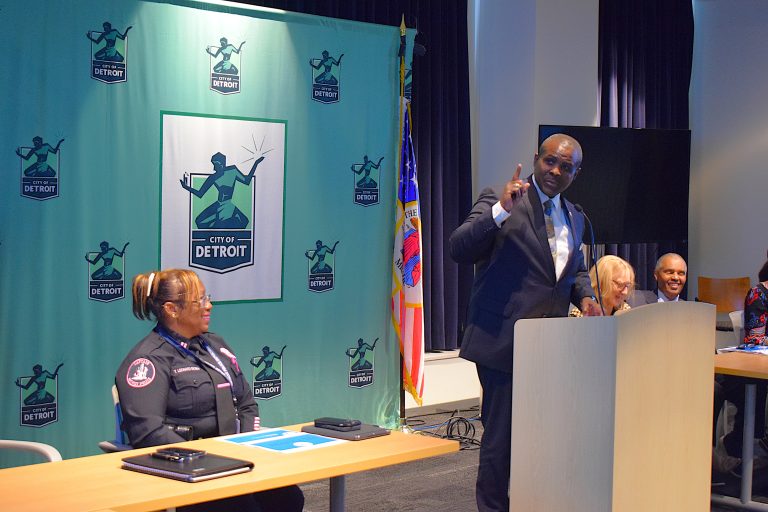Wayne County’s Behavioral Health Diversion Program Inspires National Interest
Zack Stoycoff, executive director of the Healthy Minds Policy Initiative in Tulsa, Oklahoma attended the Grant Makers in Health summit in Portland, Oregon in June 2024 and learned about Michigan’s Wayne County Behavioral Health Diversion Program.
One thing led to another. After the session, which was led by Chief Judge Freddie Burton, Jr., of Wayne County Probate Court, and Sheryl Kubiak, Ph.D., dean and director of the Wayne State University School of Social Work Center for Behavioral Health and Justice, Stoycoff recognized that his team could learn more about the diversion program on a scheduled upcoming visit to Detroit.
The Tulsa delegation of 25 added a day onto their October 2024 visit specifically to learn from the Wayne County Behavioral Health Collaborative (WCBHC).
“It was fortuitous. (The delegation’s visit) was not arranged solely around this, but it was an opportunity to repeat the presentation that the group did in Portland, here in Detroit,” says Nanci Hambrick, Wayne County initiative Manager at Center for Behavioral Health and Justice at the Wayne State University School of Social Work.
Sharing success to drive change
The WCBHC is the result of years of partnership among local organizations, including the Wayne County Sheriff’s Office, Detroit Police Department, Wayne County Probate Court, Detroit Wayne Integrated Health Network, Wayne County Commission, and the Wayne State University School of Social Work.
Guided by the Center for Behavioral Health and Justice at the Wayne State University School of Social Work, this initiative strengthens the county’s behavioral health network, promoting inclusive, equitable support for individuals and families. The Flinn Foundation supports this collaborative effort to drive lasting, positive change.
“As engaged as we all are in this work, it’s really nice to know that our efforts might be replicated in other places across the country,” says Kubiak in a Wayne State release about the event. “We really believe in the work that we’re doing, and in teamwork, and in the results that we’ve seen.”
While the needs of Tulsa may not match the needs of Wayne County, sharing experiences is an important exercise when the goal is positive change.
“They were very interested in next steps in how to do collaborative data sharing work,” Hambrick says of the Tulsa delegation. The collaborative in Wayne County has made positive steps, with more work forthcoming.
“What we got from it is there are some examples we were able to provide of work and outcomes that can come from collaboration, and there are also some opportunities to learn that there are some universal struggles when bringing together people with different needs and interests when trying to create a strong collaborative,” Hambrick says.
The gathering also featured a panel discussion moderated by Andrea Cole, Flinn Foundation president and CEO. Presenters included Dean Kubiak; Detroit Police Department Captain Tonya Leonard; Chief Robert Dunlap, jail administrator for the Wayne County Sheriff’s Office; and Chief Judge Burton, Jr., who also serves as chair of the board of trustees for the Flinn Foundation.
Other members of the WCBHC executive committee include Chairwoman Alisha Bell of the Wayne County Commission and leadership from Detroit Wayne Integrated Health Network.
“What we heard was a really impressive array of coordination happening around public safety and mental health in Detroit,” says Stoycoff in the Wayne State release. “We’ve got some really great things going on in Tulsa that we’re proud of as well, but we look forward to taking these lessons home with us.”
Learn more about Center for Behavioral Health and Justice at the Wayne State University School of Social Work.

